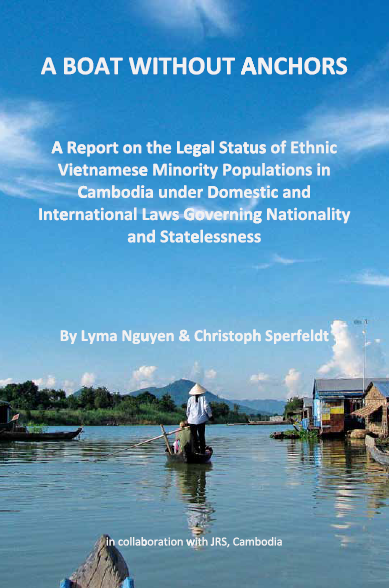
A Boat without Anchors
Publication Year: 2012 / Sources: Jesuit Refugee ServiceEthnic Vietnamese groups have lived in Cambodia throughout contemporary history. Nowadays, they are one of the largest, if not the largest, minority group in Cambodia. Despite this, the ethnic Vietnamese population in Cambodia remains understudied, with little public information available about the minority group. This paper attempts to rectify this gap in the available research by assessing a significant issue faced by large parts of the group today: their claims to Cambodian citizenship.
Download: English | Khmer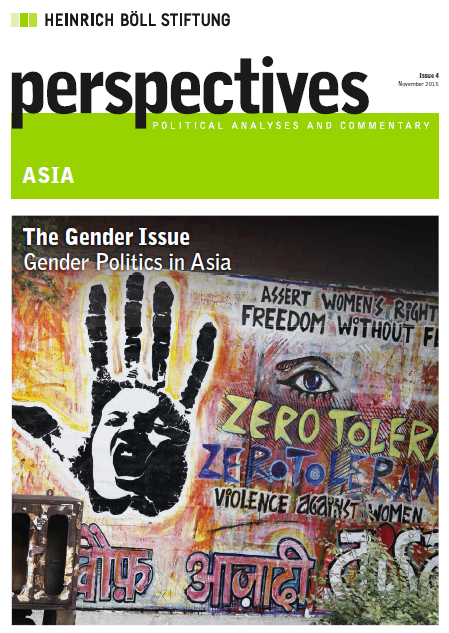
Perspectives Asia: The Gender Issue
Publication Year: 2015 / Sources: Heinrich Böll FoundationIn this edition of Perspectives Asia, the authors highlight certain aspects of gender relations and offer some very personal insights into the situations of women and men in Asia. It also emphasizes how past human rights violation in Cambodia may impact the following generation.
Download: English | Khmer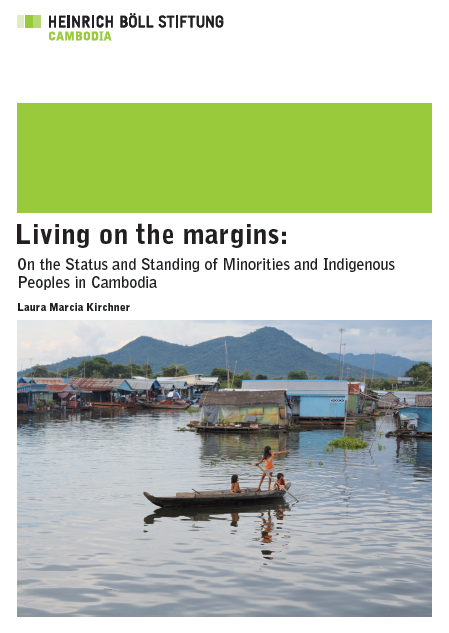
Living on the Margins: On the Status and Standing of Minorities and Indigenous Peoples in Cambodia
Publication Year: 2015 / Sources: Heinrich Böll FoundationCambodia’s current population amounts to 15, 135,169 with about 90% of Khmer origin. While it is often presented as one of the region’s most homogeneous country it is, however, home to a multitude of minority groups and Indigenous Peoples. Significantly, there is no agreement on an internationally, legally binding definition for the term “minority”.
Download: English | Khmer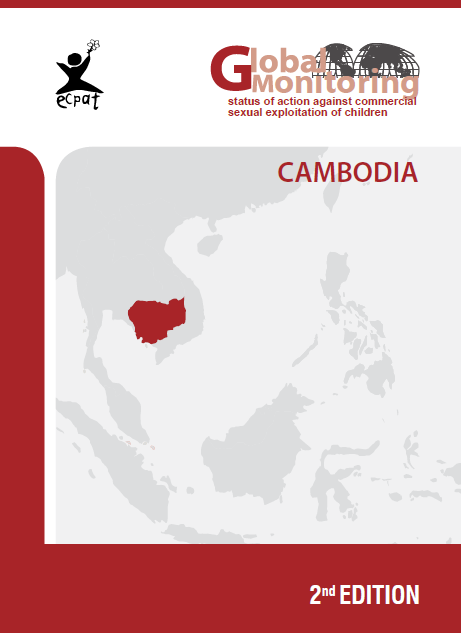
Global Monitoring: Status of Action Against Commercial Sexual Exploitation of Children
Publication Year: 2015 / Sources: End Child Prostitution, Child Pornography and the Trafficking of Children for Sexual Purposes (ECPAT International)Sexual Exploitation of Children provides a detailed framework and categories of actions to be taken by governments in partnership with civil society organizations and other relevant actors for combating commercial sexual crimes against children. Broadly, these actions are focused on: 1) Coordination and Cooperation; 2) Prevention; 3) Protection; 4) Recovery, Rehabilitation and Reintegration; and 5) Child Participation.
Download: English | Khmer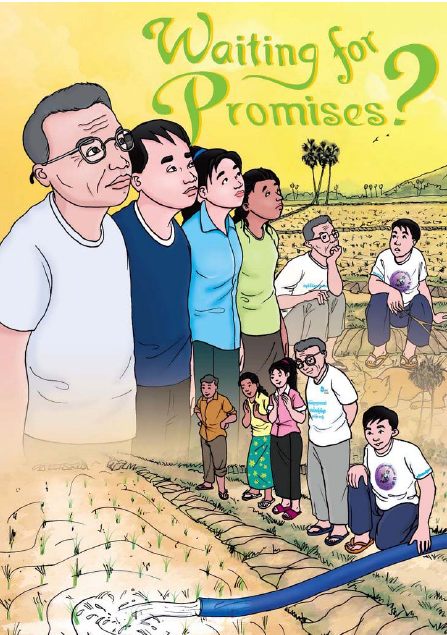
Waiting for Promises?
Publication Year: -- / Sources: Equal AccsessIt’s a picture book about the villagers who are waiting for help from their representatives. They were promised during the election campaign that an irrigation canal would be built if their representatives won the election. But the rice is starting to die because their isn’t any water for the fields. What should the villagers do?
Download: English | Khmer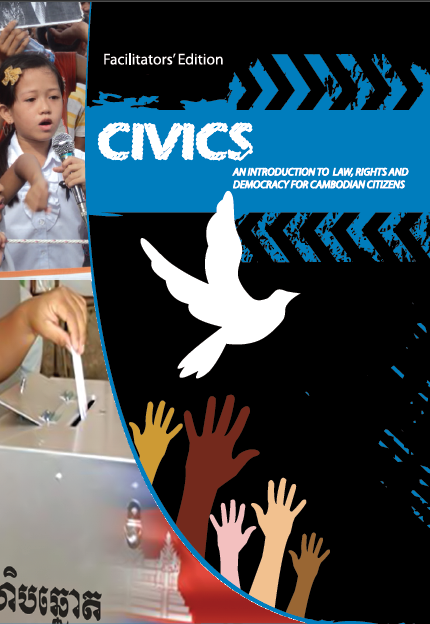
Civics: An Introduction to Law, Rights and Democracy for Cambodian Citizens
Publication Year: 2011 / Sources: Bridges Across Borders CambodiaCivics is the study of the rights and duties of citizenship. Citizens play a critical role in democratic societies, which rely on their participation to function and flourish. Being informed about civics is especially important in societies like Cambodia, which are still making the transition to a fully developed democracy.
Download: English | Khmer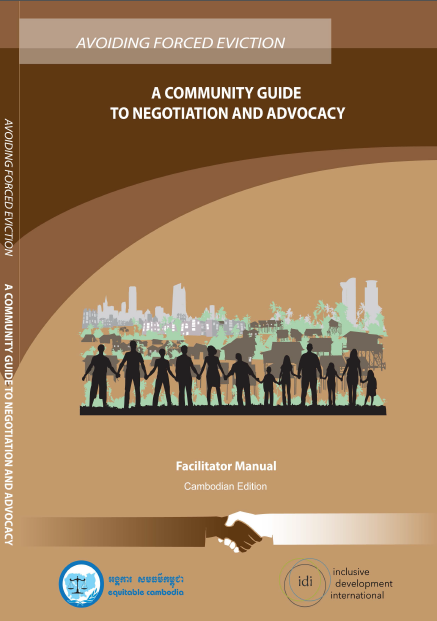
Avoiding Forced Eviction: A Community Guide to Negotiation and Advocacy
Publication Year: 2014 / Sources: Equitable Cambodia and Inclusive Development InternationalThis guide aims to help communities develop “interest-based” negotiation skills and understand how to use a range of tools to deal with the power imbalance between them and those trying to take their housing, land and resources. It may be useful to communities threatened with eviction, as long as the other party is willing to negotiate.
Download: English | Khmer
Road Safety Report 2015: Cambodia
Publication Year: 2015 / Sources: Organisation for Economic Cooperation and Development (OECD) & International Transport Forum (ITF)Rapid increases in motorisation and large numbers of young people have resulted in steadily increasing road fatalities in Cambodia. Road deaths rose 51% between 2006 and 2014. Road crashes disproportionately affect the most vulnerable road users. Motorcycles make up 80% of registered vehicles and account for nearly 70% of fatalities. The Royal Government of Cambodia has committed to a national road safety action plan to reduce road fatalities by 50% in 2020.
Download: English | Khmer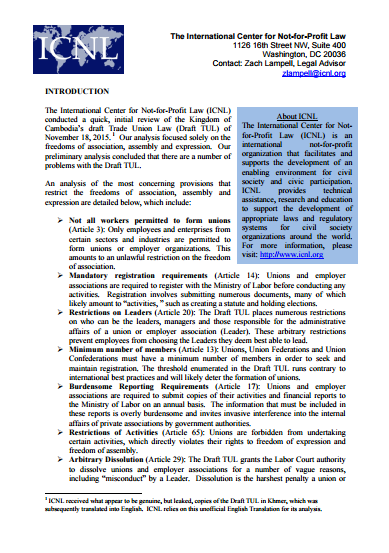
Analysis on Draft Trade Union Law
Publication Year: 2015 / Sources: The International Center for Not-for-Profit Law (ICNL)The International Center for Not-for-Profit Law (ICNL) analysis focused solely on the freedoms of association, assembly and expression. This preliminary analysis concluded that there are a number of problems with the Draft TUL.
Download: English | Khmer
Alternate Dispute Resolution Tool
Publication Year: 2013 / Sources: Cambodian Human Rights and Development Association (ADHOC)We have different mechanisms, such as negotiation, mediation or conciliation, to solve the disputes or conflicts outside the court system. This fits with the culture of Cambodian people countrywide, both in rural and urban areas, since they have used these mechanisms for centuries. However, they do not have any formalized tools or documents for solving conflicts in the future. Currently we find very few documents related to Alternative Dispute Resolution
(ADR).
